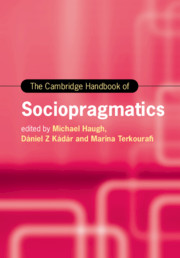Book contents
- The Cambridge Handbook of Sociopragmatics
- Cambridge Handbooks in Language and Linguistics
- The Cambridge Handbook of Sociopragmatics
- Copyright page
- Contents
- Figures
- Tables
- Contributors
- Acknowledgements
- 1 Introduction
- Part I Fundamentals of Sociopragmatics
- Part II Topics and Settings in Sociopragmatics
- 13 Face, Facework and Face-Threatening Acts
- 14 Relationships and Relating
- 15 Analysing Identity
- 16 (Im)politeness and Sociopragmatics
- 17 Affect and Emotion
- 18 Power
- 19 Morality in Sociopragmatics
- 20 Conversational Humour
- 21 Gesture and Prosody in Multimodal Communication
- 22 Digitally Mediated Communication
- 23 Workplace and Institutional Discourse
- 24 Service Encounter Discourse
- 25 Argumentative, Political and Legal Discourse
- 26 The Pragmatics of Translation
- Part III Approaches and Methods in Sociopragmatics
- Index
- References
18 - Power
from Part II - Topics and Settings in Sociopragmatics
Published online by Cambridge University Press: 01 April 2021
- The Cambridge Handbook of Sociopragmatics
- Cambridge Handbooks in Language and Linguistics
- The Cambridge Handbook of Sociopragmatics
- Copyright page
- Contents
- Figures
- Tables
- Contributors
- Acknowledgements
- 1 Introduction
- Part I Fundamentals of Sociopragmatics
- Part II Topics and Settings in Sociopragmatics
- 13 Face, Facework and Face-Threatening Acts
- 14 Relationships and Relating
- 15 Analysing Identity
- 16 (Im)politeness and Sociopragmatics
- 17 Affect and Emotion
- 18 Power
- 19 Morality in Sociopragmatics
- 20 Conversational Humour
- 21 Gesture and Prosody in Multimodal Communication
- 22 Digitally Mediated Communication
- 23 Workplace and Institutional Discourse
- 24 Service Encounter Discourse
- 25 Argumentative, Political and Legal Discourse
- 26 The Pragmatics of Translation
- Part III Approaches and Methods in Sociopragmatics
- Index
- References
Summary
Proceeding from the conviction that the concept of power remains seriously undertheorized, this chapter explores the notions of power implicit or explicit in a number of currently dominant paradigms in pragmatics, and in sociopragmatics more specifically, and suggests some alternatives and possible further lines of development. First, after an overview of different concepts of power (as presented by, among others, Bourdieu and Foucault), it argues the linguistic and the social are more deeply mutually implicated than is often realized and that, hence, the study of language use may benefit from a closer attention to questions of power. Next, it addresses questions concerning power and legitimacy in Speech Act Theory as developed by Austin and Searle; these questions are posed anew and answered in a rather different way in the study of pornography as a kind of speech act. Finally, it discusses the conceptions of power employed in the study of polite and impolite language use, arguing that some of the currently dominant frameworks in Politeness Theory rest on a number of language-ideological assumptions that appear to elide, neutralize or naturalize power relations.
- Type
- Chapter
- Information
- The Cambridge Handbook of Sociopragmatics , pp. 363 - 384Publisher: Cambridge University PressPrint publication year: 2021
References
- 1
- Cited by

